ⅰ. การเลือกล้อประตูเป็นสิ่งสำคัญมาก
เมื่อพูดถึงการทำงานที่ยืดหยุ่นของประตูโดยเฉพาะอย่างยิ่งในสภาพแวดล้อมกลางแจ้งที่ท้าทายทางเลือกของล้อประตูเป็นหัวใจสำคัญ เป็นส่วนสำคัญของการดำเนินงานประจำวันความปลอดภัยและการอุทธรณ์ความงาม อย่างไรก็ตามการตั้งค่ากลางแจ้งมีความท้าทายที่ไม่เหมือนใครไปยังล้อประตูรวมถึงอุณหภูมิที่รุนแรงความชื้นการกัดกร่อนและแม้แต่รังสีที่รุนแรงของดวงอาทิตย์
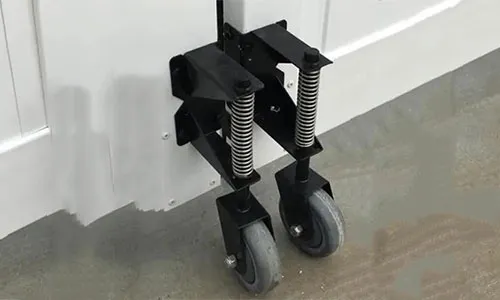
ในบทความนี้เราดำน้ำลึกเข้าไปในโลกของ Gate Wheels โดยเฉพาะการมุ่งเน้นไปที่ตัวเลือกที่ดีที่สุดที่มีอยู่ซึ่งสามารถทนต่อความยากลำบากของสภาพกลางแจ้ง ไม่ว่าคุณจะจัดการกับความร้อนที่แผดเผาฝนหนาวเย็นอย่างไม่หยุดยั้งหรือแสงจ้าของรังสีอัลตราไวโอเลตที่ไม่ยอมแพ้ล้อประตูที่เหมาะสมสามารถสร้างความแตกต่างได้ เราจะสำรวจวัสดุต่าง ๆ ที่ใช้ในประตูล้อประตูข้อดีของพวกเขาและวิธีการทำงานภายใต้ความเครียดด้านสิ่งแวดล้อมที่แตกต่างกัน เป้าหมายของเราคือการแนะนำคุณในการเลือกล้อประตูที่ไม่เพียง แต่ตรงตามข้อกำหนดการทำงานของคุณ แต่ยังช่วยเพิ่มอายุการใช้งานที่ยาวนานและประสิทธิภาพของระบบประตูของคุณ
ⅱ. ความท้าทายในสภาพแวดล้อมกลางแจ้ง
การเลือกล้อเกตที่เหมาะสมเป็นสิ่งสำคัญโดยเฉพาะอย่างยิ่งเมื่อพิจารณาถึงสภาพที่รุนแรงพวกเขามักจะอดทน สภาพแวดล้อมกลางแจ้ง- มาเจาะลึกถึงความท้าทายหลักบางอย่างที่ล้อเหล่านี้ต้องเผชิญและทำไมการทำความเข้าใจว่าเป็นกุญแจสำคัญในการตัดสินใจอย่างชาญฉลาด
1. อุณหภูมิสูงและต่ำ
ล้อประตูกลางแจ้งมีการสัมผัสกับอุณหภูมิที่แตกต่างกันอย่างต่อเนื่องตั้งแต่ความร้อนที่รุนแรงของฤดูร้อนจนถึงฤดูหนาว อุณหภูมิสูงสามารถทำให้วัสดุบางอย่างขยายและสูญเสียรูปร่างของพวกเขาในขณะที่ความเย็นมากสามารถทำให้มันเปราะและมีแนวโน้มที่จะแตก การปั่นจักรยานด้วยความร้อนนี้ทดสอบความยืดหยุ่นและความทนทานของล้อประตูเรียกร้องวัสดุที่สามารถทนต่อความผันผวนของอุณหภูมิกว้างเช่นนี้โดยไม่ลดลง
2. ฝนและการกัดกร่อน
ความชื้นเป็นอีกหนึ่งความท้าทายที่สำคัญ การสัมผัสกับฝนเป็นเวลานานอาจนำไปสู่การเกิดสนิมและการกัดกร่อนโดยเฉพาะอย่างยิ่งในส่วนประกอบโลหะของล้อประตู สิ่งนี้ไม่เพียง แต่จะทำให้ความสมบูรณ์ของโครงสร้างของล้ออ่อนแอลงเท่านั้น แต่ยังสามารถนำไปสู่ปัญหาการปฏิบัติงานเช่นความแข็งหรือการส่งเสียงดังเอี้ยซึ่งเป็นอันตรายต่อทั้งการทำงานและอายุยืน
3. รังสีอัลตราไวโอเลต (UV)
รังสี UV ของดวงอาทิตย์นั้นมักถูกมองข้าม แต่เป็นปัจจัยสำคัญในการเสื่อมสภาพของล้อประตู การได้รับรังสียูวีอย่างต่อเนื่องสามารถนำไปสู่การซีดจางลดลงและในบางกรณีการสลายของวัสดุโดยเฉพาะอย่างยิ่งในพลาสติกที่ทนต่อยูวีหรือยาง การย่อยสลายนี้สามารถลดช่วงอายุการใช้งานของวงล้อประตูได้อย่างมากทำให้เกิดการเปลี่ยนบ่อยครั้งและค่าใช้จ่ายในการบำรุงรักษาที่เพิ่มขึ้น
ⅲ. ประเภทของวัสดุล้อเกตที่ดีที่สุด
ในส่วนนี้เราสำรวจวัสดุต่าง ๆ ที่ใช้ในการก่อสร้าง ลูกล้อประตูแต่ละคนเสนอผลประโยชน์ที่ไม่ซ้ำกันและความเหมาะสมสำหรับสภาพแวดล้อมที่แตกต่างกัน
1. ลูกล้อประตูโพลียูรีเทน
โพลียูรีเทนวัสดุที่หลากหลายและยืดหยุ่นโดดเด่นเป็นตัวเลือกที่เหมาะสำหรับล้อประตูโดยเฉพาะอย่างยิ่งในการตั้งค่ากลางแจ้ง ล้อเหล่านี้มีชื่อเสียงในด้านความสามารถในการรับน้ำหนักที่ยอดเยี่ยมทำให้เหมาะสำหรับประตูและน้ำหนักที่หลากหลาย หนึ่งในข้อได้เปรียบที่สำคัญที่สุดของโพลียูรีเทนคือความต้านทานการสึกหรอที่น่าทึ่ง ประตูที่เห็นการใช้งานบ่อยครั้งจะได้รับประโยชน์จากความทนทานนี้เนื่องจากล้อโพลียูรีเทนรักษาความสมบูรณ์และรูปร่างของพวกเขาในช่วงเวลาที่ยาวนาน
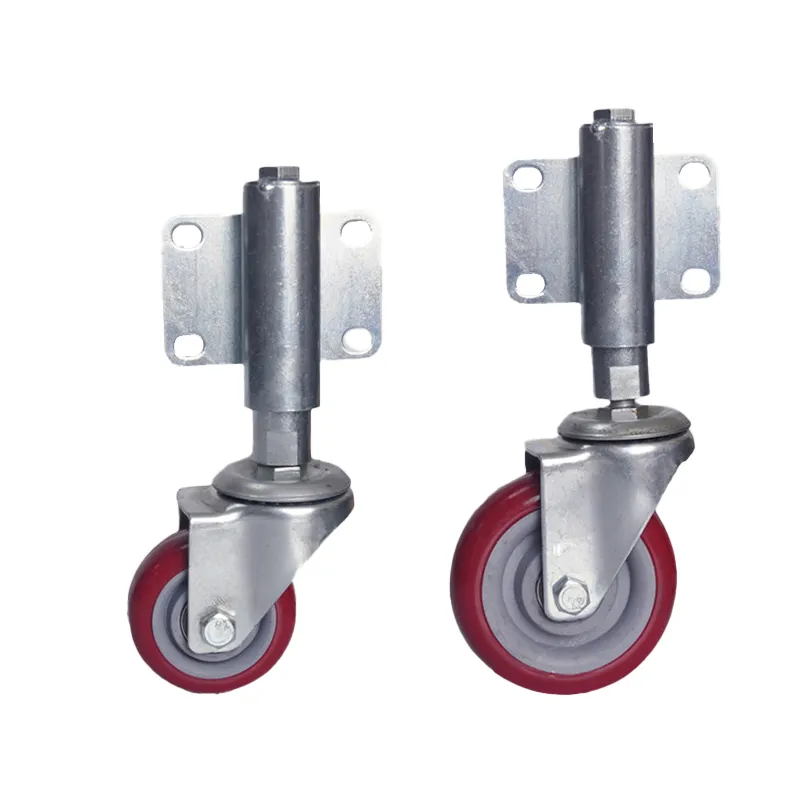
นอกจากนี้โพลียูรีเทนมีความต้านทานทางเคมีซึ่งเป็นสิ่งสำคัญสำหรับประตูที่สัมผัสกับสารต่าง ๆ ไม่ว่าจะเป็นสารเคมีอุตสาหกรรมหรือมลพิษในชีวิตประจำวัน วัสดุนี้ยังมีความสามารถในการลดเสียงรบกวนโดยให้การทำงานที่เงียบกว่าเมื่อเทียบกับวัสดุที่แข็งกว่าเช่นเหล็กหรือไนลอน สิ่งนี้เป็นประโยชน์อย่างยิ่งในพื้นที่ที่อยู่อาศัยหรือสภาพแวดล้อมที่จำเป็นต้องลดเสียงรบกวน ยิ่งไปกว่านั้นลูกล้อโพลียูรีเทนทำงานได้อย่างน่าชื่นชมภายใต้อุณหภูมิที่หลากหลายรักษาความยืดหยุ่นและความแข็งแรงทั้งในสภาพแวดล้อมที่ร้อนและเย็น การต่อต้านรังสียูวีของพวกเขาช่วยเพิ่มความเหมาะสมในการใช้งานกลางแจ้งเพื่อให้แน่ใจว่าพวกเขาจะไม่ลดลงอย่างรวดเร็วภายใต้รังสีอันโหดร้ายของดวงอาทิตย์
2. ประตูล้อยาง
ยาง เป็นอีกหนึ่งวัสดุยอดนิยมสำหรับลูกล้อประตูซึ่งมีค่าสำหรับมัน ดูดซับ คุณสมบัติ. คุณภาพนี้เป็นประโยชน์อย่างยิ่งสำหรับประตูที่ติดตั้งบนพื้นผิวที่ไม่สม่ำเสมอหรือที่สัมผัสกับการสั่นสะเทือนบ่อยครั้งเนื่องจากยางช่วยลดผลกระทบซึ่งจะยืดอายุการใช้งานของทั้งล้อและประตู ล้อยางเป็นที่รู้จักกันดีในเรื่องการทำงานที่เงียบสงบทำให้พวกเขาเป็นตัวเลือกที่ยอดเยี่ยมสำหรับประตูที่อยู่อาศัยซึ่งการลดเสียงรบกวนเป็นสิ่งสำคัญ
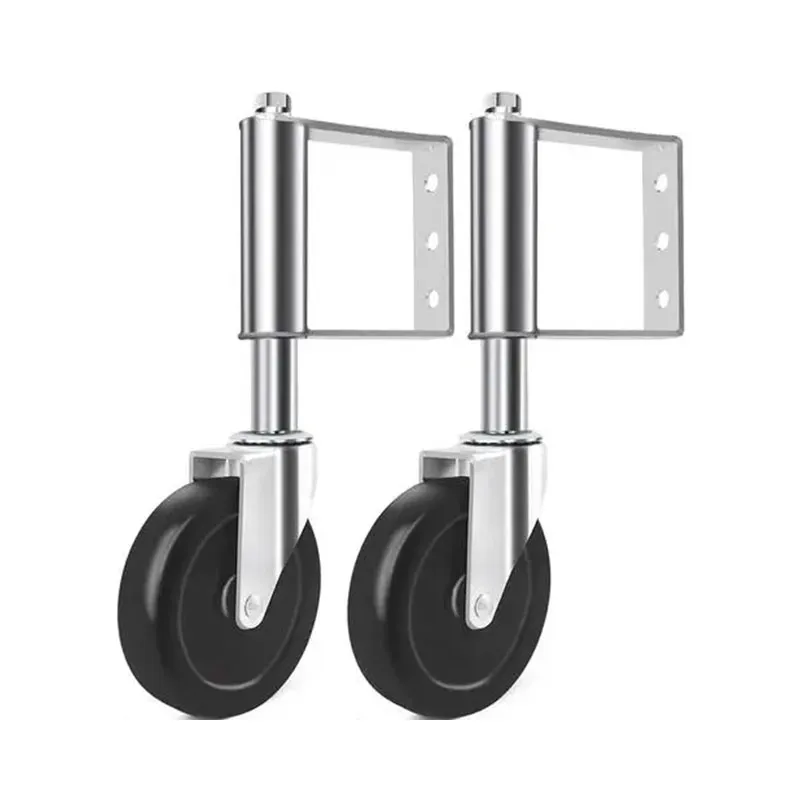
ในแง่ของความต้านทานการสึกหรอยางยืนขึ้นได้ดีโดยเฉพาะอย่างยิ่งในสภาพแวดล้อมที่ประตูอาจเคลื่อนที่ผ่านพื้นผิวที่มีการขัด การยึดเกาะของวัสดุนี้เป็นคุณสมบัติที่โดดเด่นอีกอย่างหนึ่ง ล้อยางสามารถรักษาแรงฉุดบนพื้นผิวลื่นหรือเปียกเพิ่มความปลอดภัยและความมั่นคงของการทำงานของประตู ในขณะที่ยางโดยทั่วไปจะทนต่อน้ำทำให้เหมาะสำหรับสภาพฝนตก แต่สิ่งสำคัญคือต้องทราบว่ามันอาจไวต่อการย่อยสลายจากสารเคมีบางชนิดและการสัมผัสกับรังสี UV ที่รุนแรง ดังนั้น Casters ประตูยางจึงเหมาะที่สุดสำหรับสภาพแวดล้อมที่การสัมผัสทางเคมีมี จำกัด และการย่อยสลายรังสียูวีสามารถจัดการหรือบรรเทาได้
3. ลูกล้อประตูไนลอน
ลูกล้อไนลอน เป็นตัวเลือกที่แข็งแกร่งซึ่งเป็นที่รู้จักกันดีในเรื่องการต่อต้านการสึกหรออย่างไม่น่าเชื่อ วัสดุสังเคราะห์นี้สามารถทนต่อการเสียดสีจำนวนมากทำให้เหมาะสำหรับประตูที่ดำเนินการบ่อยครั้งหรือเคลื่อนที่ผ่านพื้นผิวที่ขรุขระ ความต้านทานต่อสารเคมีของไนลอนเป็นข้อได้เปรียบที่สำคัญอีกประการหนึ่งเนื่องจากสามารถทนต่อการสัมผัสกับสารอุตสาหกรรมต่าง ๆ โดยไม่ลดลง สิ่งนี้ทำให้ Nylon Casters เป็นตัวเลือกที่เหมาะสมสำหรับการตั้งค่าอุตสาหกรรมหรือพื้นที่ที่การสัมผัสทางเคมีเป็นไปได้
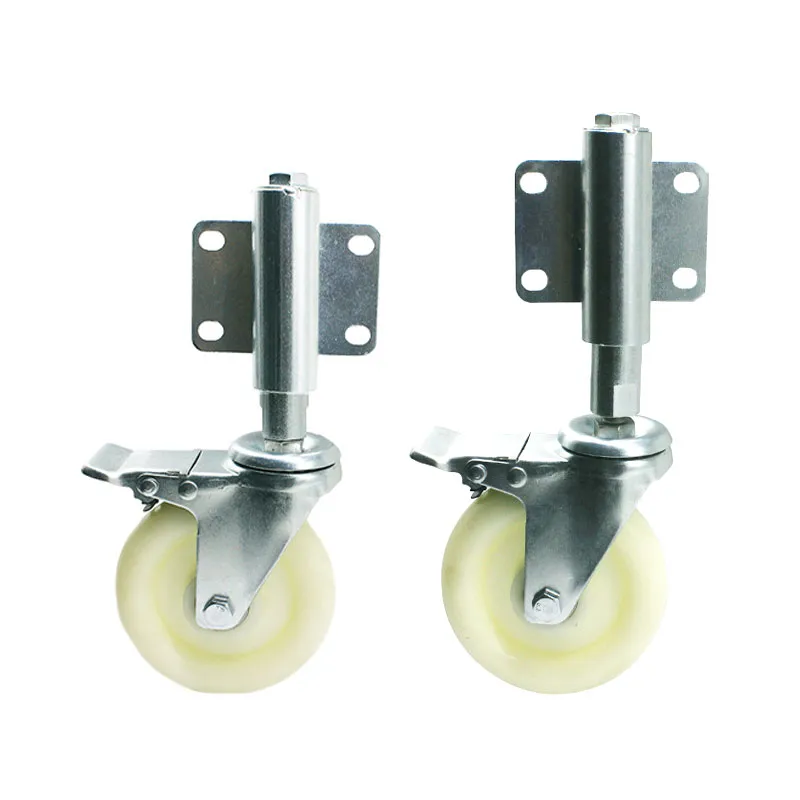
อย่างไรก็ตามหนึ่งในข้อเสียของไนลอนคือระดับเสียงรบกวน เมื่อเปรียบเทียบกับโพลียูรีเทนและยางล้อไนล่อนมักจะดังขึ้นในระหว่างการทำงานซึ่งอาจเป็นการพิจารณาในสภาพแวดล้อมที่ไวต่อเสียง นอกจากนี้ในขณะที่ไนลอนมีความทนทาน แต่ก็ไม่มีคุณสมบัติที่ดูดซับแรงกระแทกที่พบในยางซึ่งอาจนำไปสู่การทำงานที่ราบรื่นน้อยลงบนพื้นผิวที่ไม่สม่ำเสมอ ในแง่ของความต้านทานรังสียูวีไนล่อนดำเนินการในระดับปานกลาง แต่อาจต้องใช้การรักษาเพิ่มเติมหรือการเคลือบเพื่อการป้องกันที่เพิ่มขึ้นในสภาพแวดล้อมที่สัมผัสกับรังสี UV สูง
วัสดุเหล่านี้แต่ละชิ้นมีข้อได้เปรียบที่แตกต่างกันและอาจเหมาะกับประตูและสภาพแวดล้อมประเภทต่าง ๆ การทำความเข้าใจคุณสมบัติเหล่านี้ช่วยให้สามารถตัดสินใจได้อย่างมีข้อมูลเมื่อเลือกเกตแคสเตอร์ที่ดีที่สุดสำหรับความต้องการเฉพาะของคุณ
ⅳ. วัสดุสปริงยึดสำหรับลูกล้อประตู
เมื่อพูดถึงลูกล้อประตูวัสดุของวงเล็บฤดูใบไม้ผลิของกล้องโทรทรรศน์นั้นมีความสำคัญอย่างยิ่งต่อล้อ ตัวยึดมีบทบาทสำคัญในการให้การสนับสนุนความเสถียรและความทนทานต่อชุดล้อประตู ที่นี่เราจะหารือเกี่ยวกับวัสดุหลักสองประเภทที่ใช้สำหรับวงเล็บเหล่านี้: เหล็กชุบสังกะสีและสแตนเลส แต่ละข้อเสนอข้อได้เปรียบที่แตกต่างและเหมาะสมกับความต้องการของโครงการที่แตกต่างกัน
1. วงเล็บชุบสังกะสี
วงเล็บเหล็กชุบสังกะสีเป็นตัวเลือกยอดนิยมส่วนใหญ่เป็นผลมาจากความคุ้มค่า กระบวนการชุบสังกะสีเกี่ยวข้องกับการเคลือบเหล็กด้วยชั้นป้องกันของสังกะสีซึ่งช่วยเพิ่มความต้านทานต่อการเกิดสนิมและการกัดกร่อนอย่างมีนัยสำคัญ สิ่งนี้มีความสำคัญอย่างยิ่งในสภาพแวดล้อมกลางแจ้งที่วงเล็บสัมผัสกับความชื้นและสภาพอากาศที่แตกต่างกัน การเคลือบสังกะสีช่วยให้มั่นใจได้ว่าแม้ว่าพื้นผิวจะมีรอยขีดข่วนหรือเสียหาย แต่เหล็กพื้นฐานยังคงได้รับการปกป้อง
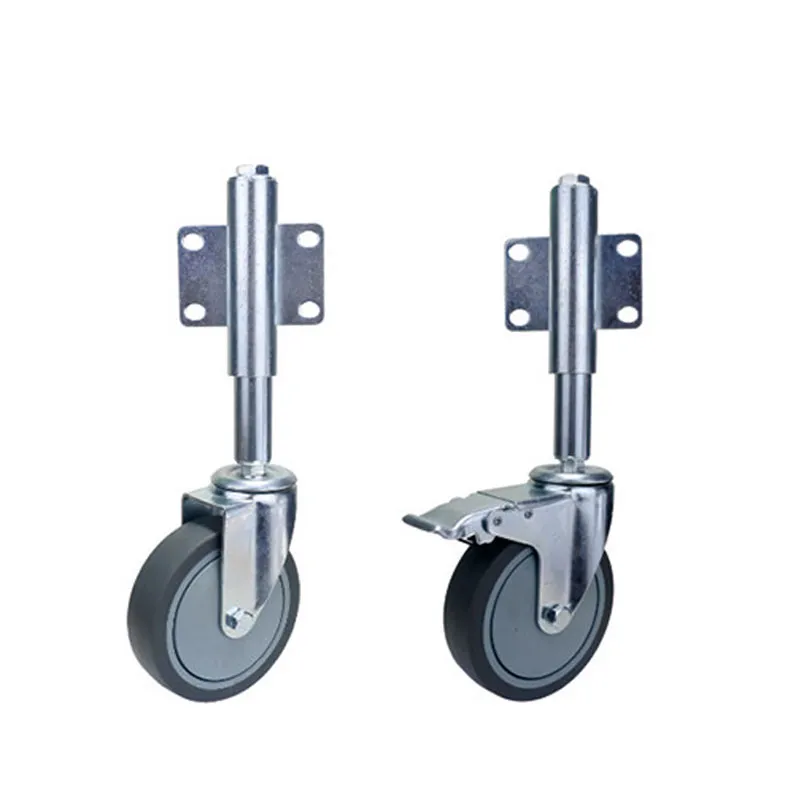
ความสามารถในการจ่ายของวงเล็บชุบสังกะสีทำให้พวกเขาเป็นตัวเลือกที่ยอดเยี่ยมสำหรับโครงการระยะสั้นหรือแอปพลิเคชันที่ข้อ จำกัด ด้านงบประมาณเป็นข้อพิจารณาเบื้องต้น ในขณะที่พวกเขามีความทนทานที่ดีเป็นสิ่งสำคัญที่จะต้องทราบว่าอายุยืนของการเคลือบสังกะสีอาจแตกต่างกันไปตามปัจจัยด้านสิ่งแวดล้อม ในสภาพแวดล้อมที่มีการกัดกร่อนสูงเช่นพื้นที่ชายฝั่งที่มีสเปรย์เกลืออายุการใช้งานของการชุบสังกะสีอาจสั้นลง
2. วงเล็บสแตนเลส
วงเล็บสแตนเลสเป็นตัวเลือกระดับพรีเมี่ยมสำหรับวงเล็บประตูลูกโซ่ที่มีชื่อเสียงในด้านความต้านทานการกัดกร่อนที่ยอดเยี่ยมและการดึงดูดความงาม สแตนเลสสตีลต่อต้านการเกิดสนิมและการกัดกร่อนโดยเนื้อแท้ด้วยการปรากฏตัวของโครเมียมในโลหะผสม สิ่งนี้ทำให้เป็นวัสดุที่เหมาะสำหรับสภาพแวดล้อมที่รุนแรงหรือมีองค์ประกอบที่กัดกร่อน
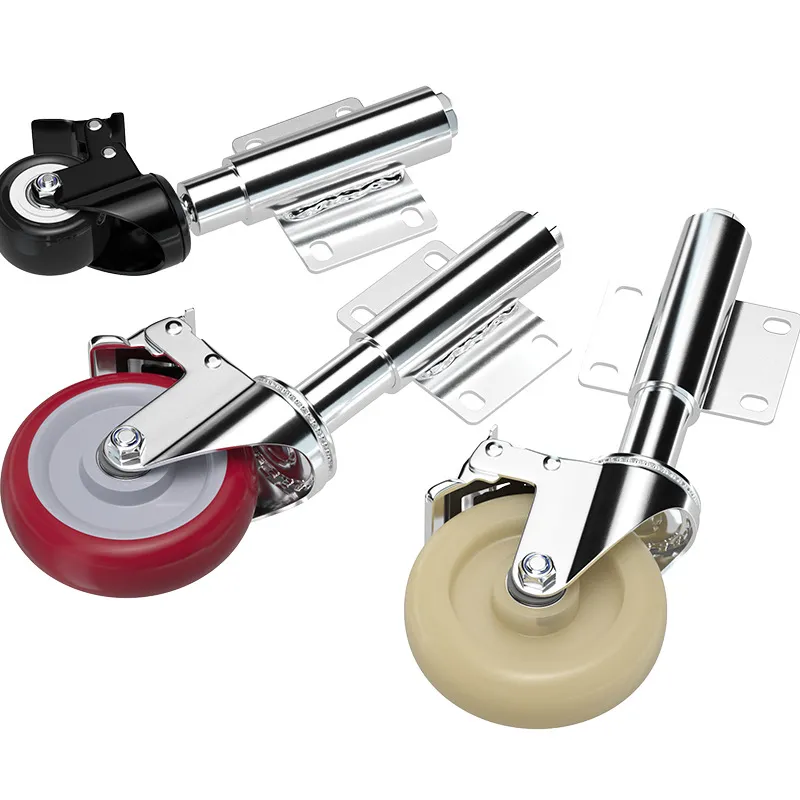
ในขณะที่วงเล็บสแตนเลสมีราคาแพงกว่าคู่ชุบสังกะสีของพวกเขา แต่พวกเขาให้อายุการใช้งานที่ยาวนานและประสิทธิภาพการบำรุงรักษาที่เหนือกว่าซึ่งสามารถประหยัดค่าใช้จ่ายได้ในระยะยาว การดึงดูดความงามของพวกเขายังเพิ่มลักษณะโดยรวมของประตูทำให้พวกเขาเป็นตัวเลือกที่ชื่นชอบสำหรับโครงการที่ผลกระทบด้านภาพคือการพิจารณา แนะนำให้ใช้วงเล็บสแตนเลสโดยเฉพาะอย่างยิ่งสำหรับโครงการหรือแอปพลิเคชันระยะยาวที่มีความทนทานและลักษณะที่ปรากฏเป็นสิ่งสำคัญยิ่ง
โดยสรุปการเลือกระหว่างวงเล็บสังกะสีและสแตนเลสควรขึ้นอยู่กับความต้องการเฉพาะของโครงการโดยพิจารณาจากปัจจัยต่าง ๆ เช่นสภาพแวดล้อมงบประมาณและอายุการใช้งานที่ต้องการของเกตแคสเตอร์ สำหรับความทนทานในระยะยาวและการดึงดูดความงามสแตนเลสเป็นตัวเลือกที่ต้องการในขณะที่เหล็กชุบสังกะสีเสนอตัวเลือกที่เป็นมิตรกับงบประมาณมากขึ้นสำหรับการใช้งานระยะสั้นหรือต้องการการใช้งาน
ⅴ. บทสรุป
เมื่อเราไปถึงจุดสิ้นสุดของคู่มือที่ครอบคลุมของเราในการเลือกล้อประตูที่ดีที่สุดเป็นที่ชัดเจนว่าตัวเลือกที่เหมาะสมสามารถช่วยเพิ่มฟังก์ชั่นการทำงานความทนทานและประสิทธิภาพโดยรวมของประตูของคุณ ที่ บูลคาสเตอร์เราภูมิใจในความเข้าใจอย่างลึกซึ้งเกี่ยวกับเทคโนโลยีลูกล้อและความมุ่งมั่นของเราในการจัดหาโซลูชั่นที่ตอบสนองความต้องการเฉพาะของลูกค้าของเรา
โอบกอดทางออกที่สมบูรณ์แบบ
ไม่ว่าคุณจะเผชิญกับรังสีที่รุนแรงของดวงอาทิตย์ต่อสู้กับฝนและการกัดกร่อนหรือจัดการกับอุณหภูมิที่แตกต่างกันเรามีทางออกที่เหมาะสม ระยะของโพลียูรีเทนยางและประตูไนลอนของเราควบคู่ไปกับการเลือกวัสดุยึดที่แข็งแกร่งของเราเช่นชุบสังกะสีและสแตนเลสทำให้มั่นใจได้ว่าประตูของคุณทำงานได้อย่างราบรื่นมีประสิทธิภาพและยาวนานขึ้น
การปรับแต่งและความเชี่ยวชาญ
เราเข้าใจว่าทุกโครงการมีเอกลักษณ์และความต้องการของคุณก็เช่นกัน นั่นคือเหตุผลที่เราเสนอ ตัวเลือกการปรับแต่ง to tailor our products to your specific requirements. Our team of experts is always ready to provide consultation and advice, helping you navigate through the selection process to find the perfect match for your gate. contact us now!


